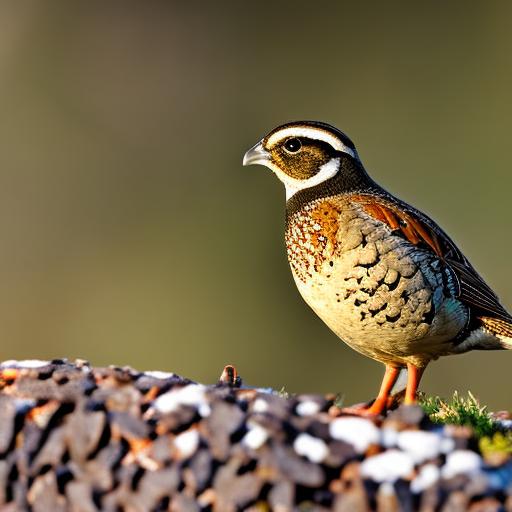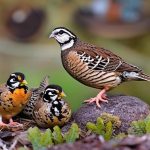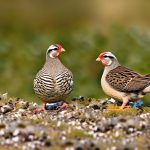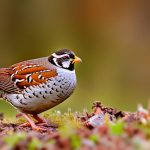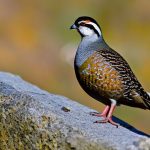Keeping quail outside can be a rewarding and enjoyable experience for both hobbyists and commercial breeders. Quail are hardy birds that are well-suited to outdoor living, and they can thrive in a variety of climates and environments. Whether you are interested in raising quail for their eggs, meat, or simply as pets, providing them with a natural outdoor habitat can lead to healthier, happier birds.
By allowing quail to live outdoors, you are giving them the opportunity to exhibit natural behaviors such as dust bathing, foraging, and socializing with their flock mates. Additionally, outdoor living can provide quail with access to a more varied diet, exposure to natural sunlight, and increased exercise, all of which can contribute to their overall well-being. In this article, we will explore the various aspects of keeping quail outside, including choosing the right breed, creating a suitable habitat, providing shelter and protection from predators, feeding and watering, health and safety considerations, and tips for successful outdoor quail keeping.
Key Takeaways
- Keeping quail outside can be a rewarding and sustainable way to raise these birds for eggs and meat.
- When choosing a quail breed for outdoor housing, consider factors such as climate, space, and purpose (eggs, meat, or both).
- Creating a suitable outdoor habitat for quail involves providing adequate space, shelter, and access to food and water.
- Adequate shelter and protection from predators are essential for keeping quail safe and secure in an outdoor setting.
- Feeding and watering quail in an outdoor setting requires providing a balanced diet and ensuring access to clean water at all times.
Choosing the Right Quail Breed for Outdoor Housing
When it comes to keeping quail outside, choosing the right breed is an important consideration. There are several different breeds of quail that are well-suited to outdoor living, each with its own unique characteristics and requirements. Some popular breeds for outdoor housing include the Coturnix quail, Bobwhite quail, and California quail.
Coturnix quail, also known as Japanese quail, are one of the most commonly raised quail breeds due to their small size, high egg production, and relatively calm temperament. They are well-adapted to outdoor living and can thrive in a variety of climates. Bobwhite quail are another popular choice for outdoor housing, particularly for those interested in raising quail for meat. They are known for their delicious meat and are relatively easy to care for in an outdoor setting. California quail, on the other hand, are often kept for their ornamental value and are prized for their striking plumage and distinctive topknot. Regardless of the breed you choose, it is important to select birds that are healthy, disease-free, and well-suited to the climate and environment in which they will be living.
Creating a Suitable Outdoor Habitat for Quail
Creating a suitable outdoor habitat for quail is essential for their health and well-being. When designing an outdoor space for quail, it is important to consider factors such as space requirements, shelter, protection from predators, and environmental enrichment. Quail require a minimum of 1-2 square feet of space per bird in their outdoor enclosure to ensure they have enough room to move around and exhibit natural behaviors.
In addition to adequate space, quail also need access to shelter from the elements, such as sun, wind, and rain. This can be provided in the form of natural vegetation, such as bushes or trees, or man-made structures like shelters or coops. It is important to ensure that the shelter is well-ventilated and provides protection from extreme temperatures. Environmental enrichment is also important for outdoor quail habitats, as it can help prevent boredom and encourage natural behaviors. This can include providing areas for dust bathing, perches for roosting, and access to natural vegetation for foraging.
Providing Adequate Shelter and Protection from Predators
One of the most important considerations when keeping quail outside is providing adequate shelter and protection from predators. Quail are vulnerable to a wide range of predators, including birds of prey, raccoons, foxes, snakes, and even domestic pets. To protect your quail from these threats, it is essential to design their outdoor habitat with predator-proofing in mind.
This can include using sturdy wire mesh to enclose the outdoor space and prevent access from above and below. Additionally, adding a secure roof to the enclosure can help protect quail from aerial predators. It is also important to regularly inspect the enclosure for any signs of wear or damage that could compromise its integrity and make it easier for predators to gain access. Providing a secure shelter within the enclosure where quail can roost at night can also help protect them from nocturnal predators.
Feeding and Watering Quail in an Outdoor Setting
Feeding and watering quail in an outdoor setting requires careful consideration to ensure that they have access to a balanced diet and clean water at all times. Quail are omnivorous birds that require a diet high in protein to support their growth, egg production, and overall health. In an outdoor setting, quail can supplement their diet by foraging for insects, seeds, and vegetation, but it is important to also provide them with a commercial game bird feed that is specifically formulated for their nutritional needs.
In addition to providing a balanced diet, it is essential to ensure that quail have access to clean water at all times. This can be achieved by using waterers that are designed to prevent spills and contamination, as well as regularly cleaning and refilling them to prevent the growth of harmful bacteria. In colder climates, it is important to prevent water from freezing by using heated waterers or regularly replacing frozen water with fresh water.
Health and Safety Considerations for Outdoor Quail Keeping
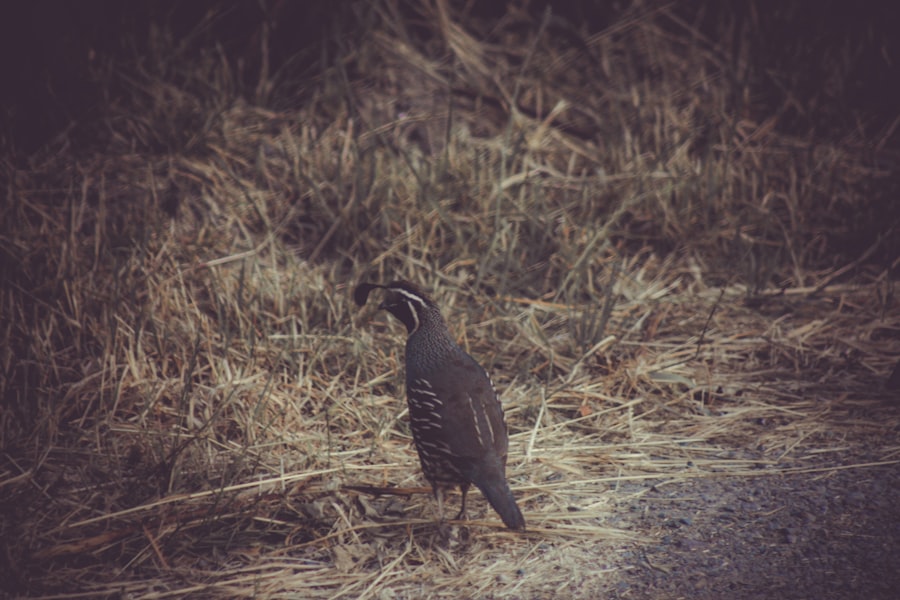
When keeping quail outside, it is important to be mindful of potential health and safety considerations that can impact the well-being of your birds. Common health issues that can affect outdoor quail include parasites such as mites and lice, respiratory infections, and injuries from predators or environmental hazards. To prevent these issues, it is important to regularly inspect your quail for signs of illness or injury and provide them with a clean and safe environment.
Additionally, practicing good biosecurity measures can help prevent the spread of diseases among your flock. This can include quarantining new birds before introducing them to your existing flock, regularly cleaning and disinfecting feeders and waterers, and limiting exposure to wild birds or other potential sources of disease. Providing regular veterinary care and vaccinations can also help prevent common health issues and ensure that your quail remain healthy and thriving in their outdoor environment.
Tips for Successfully Keeping Quail Outside
Successfully keeping quail outside requires careful planning, attention to detail, and a commitment to providing your birds with the best possible care. Some tips for successful outdoor quail keeping include:
– Providing ample space for your quail to move around and exhibit natural behaviors
– Ensuring that their outdoor habitat provides adequate shelter from the elements
– Implementing predator-proofing measures to protect your quail from potential threats
– Providing a balanced diet and clean water at all times
– Regularly monitoring your quail for signs of illness or injury
– Practicing good biosecurity measures to prevent the spread of disease
– Seeking veterinary care when needed
– Providing environmental enrichment to encourage natural behaviors
By following these tips and taking a proactive approach to caring for your outdoor quail, you can create a safe and enriching environment where your birds can thrive and flourish. Whether you are raising quail for eggs, meat, or simply as pets, keeping them outside can provide numerous benefits for both the birds and their keepers. With proper planning and attention to their needs, outdoor quail keeping can be a fulfilling and enjoyable experience for anyone interested in these fascinating birds.
If you’re considering keeping quail outside, you may also be interested in learning about the best locations for a chicken coop. Poultry Wizard offers a helpful article on where to put a chicken coop, which provides valuable insights into creating an optimal environment for your poultry. Understanding the ideal placement for your coop can contribute to the overall well-being and productivity of your birds.
FAQs
What are the benefits of keeping quail outside?
Keeping quail outside allows them to have access to natural sunlight, fresh air, and a more natural environment. It also provides them with more space to roam and forage, which can contribute to their overall health and well-being.
What do quail need in their outdoor environment?
Quail need a secure and predator-proof enclosure to protect them from potential threats. They also require access to shade, shelter, and clean water. Additionally, they benefit from having access to a variety of plants, insects, and other natural elements for foraging.
What are the potential challenges of keeping quail outside?
Some potential challenges of keeping quail outside include the risk of predation, exposure to extreme weather conditions, and the need for regular maintenance of their outdoor enclosure. Additionally, it’s important to ensure that the quail have access to a balanced diet and are protected from potential diseases.
How can I ensure the safety and well-being of quail kept outside?
To ensure the safety and well-being of quail kept outside, it’s important to provide them with a secure and predator-proof enclosure, regular access to clean water and a balanced diet, and protection from extreme weather conditions. Regular monitoring and maintenance of their outdoor environment is also crucial.
Meet Walter, the feathered-friend fanatic of Florida! Nestled in the sunshine state, Walter struts through life with his feathered companions, clucking his way to happiness. With a coop that’s fancier than a five-star hotel, he’s the Don Juan of the chicken world. When he’s not teaching his hens to do the cha-cha, you’ll find him in a heated debate with his prized rooster, Sir Clucks-a-Lot. Walter’s poultry passion is no yolk; he’s the sunny-side-up guy you never knew you needed in your flock of friends!

